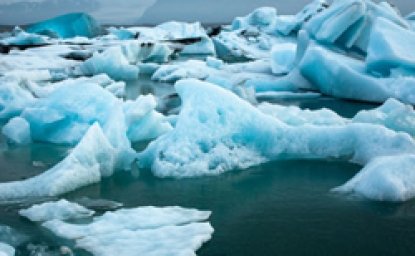Who Owns the Arctic? Part I
In this Context interview, an international panel of experts described why one of the world's coldest environments has become a hot topic.
In this Context interview, an international panel of experts described why one of the world's coldest environments has become a hot topic.
Tensions over security, access, and environmental impacts in the Arctic are rising. While members of the Arctic Council (Canada, Denmark, Finland, Iceland, Norway, Russia, Sweden, the United States) assert their established rights under new circumstances, an increasing number of non-Arctic states (including China, Korea, Japan, and Singapore) seek an active role in the region.
In part 1 of our series, “Focus on the Arctic,” an international panel of experts describes why one of the world’s coldest environments is becoming a hot topic.
Guests
Heather Conley, Center for Strategic & International Studies
Marlene Laruelle, George Washington University
Robert Huebert, University of Calgary
Willy Østreng, Norwegian Academy of Polar Research
Aki Tonami, University of Copenhagen
Anne-Marie Brady, Woodrow Wilson Center and the University of Canterbury, New Zealand



The Kissinger Institute works to ensure that China policy serves American long-term interests and is founded in understanding of historical and cultural factors in bilateral relations and in accurate assessment of the aspirations of China’s government and people. Read more


The Indo-Pacific Program promotes policy debate and intellectual discussions on US interests in the Asia-Pacific as well as political, economic, security, and social issues relating to the world’s most populous and economically dynamic region. Read more


The mission of the Wilson Center's Canada Institute is to raise the level of knowledge of Canada in the United States, particularly within the Washington, DC policy community. Research projects, initiatives, podcasts, and publications cover contemporary Canada, US-Canadian relations, North American political economy, and Canada's global role as it intersects with US national interests. Read more


The Global Europe Program is focused on Europe’s capabilities, and how it engages on critical global issues. We investigate European approaches to critical global issues. We examine Europe’s relations with Russia and Eurasia, China and the Indo-Pacific, the Middle East and Africa. Our initiatives include “Ukraine in Europe”—an examination of what it will take to make Ukraine’s European future a reality. But we also examine the role of NATO, the European Union and the OSCE, Europe’s energy security, transatlantic trade disputes, and challenges to democracy. The Global Europe Program’s staff, scholars-in-residence, and Global Fellows participate in seminars, policy study groups, and international conferences to provide analytical recommendations to policy makers and the media. Read more


The Kennan Institute is the premier US center for advanced research on Eurasia and the oldest and largest regional program at the Woodrow Wilson International Center for Scholars. The Kennan Institute is committed to improving American understanding of Russia, Ukraine, Central Asia, the South Caucasus, and the surrounding region through research and exchange. Read more




